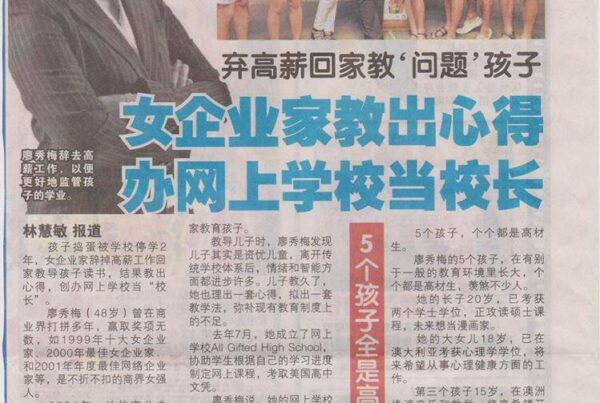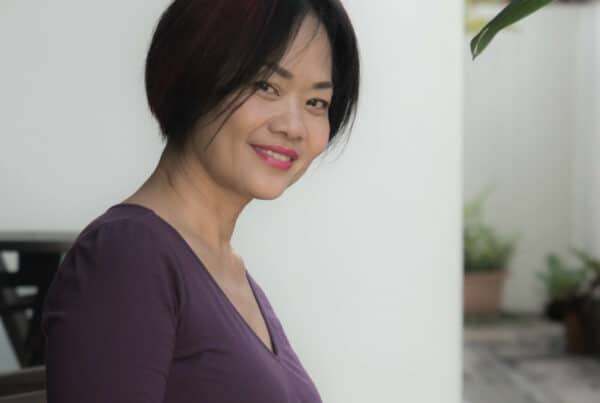Anthony Yip took two O-level mathematics papers last year as a private candidate and scored A* in both. He was then nine and a Primary 4 pupil at Henry Park Primary School.
He says he finished the two-hour papers much earlier than his older peers but did not want to draw attention to himself by handing in the paper first. He says: “I waited till the first person handed in the paper, then I handed in mine.”
His father, orthopaedic surgeon Kevin Yip, 51, says the boy had three months’ worth of twice-weekly tutoring before the examinations. The O-level examinations are normally done by those nine years older.
“We were just trying him out to see if he was a prodigy like his siblings,” says Dr Yip, who is married to Dr Joanna Lin, 49, an oncologist.
Anthony’s siblings, Bryan and Michelle, were 14 and 12 respectively when they took their O-level examinations in 2007 and scored 15 distinctions between them.
Today, Bryan, 20, is a second-year medicine student at Monash University in Melbourne while Michelle, 18, is studying medicine at Cambridge University.
Anthony, who read the encyclopaedia at five, may outshine them, says dad. “He was talking to me about Graham’s number, teaching me concepts and how to derive the formula for Pythagorus theorum at seven.
“Anthony’s enjoying his childhood, playing computer games, being happy and jolly – that’s important. We’re just wondering whether we should fast-track him or not,” he says.
The Ministry of Education (MOE) allows “grade skipping or subject acceleration” on a case-by-case basis, taking into account the child’s social and emotional development. Since 2000, seven children have skipped a grade level in primary schools. Of those who were subject accelerated, two were at the primary level, while the remaining seven were in secondary school.
For O- and A-level examinations in the past five years, there were on average fewer than four candidates a year who took the examination ahead of their peers. For parents of child prodigies, there is good reason to be cautious about fast-tracking.
Dr Daniel Fung, chairman of the Institute of Mental Health’s medical board, 46, says: “When a young child goes to higher-level studies or university where everybody is a teenager or young adult, the discrepancies in physical, emotional and social age may cause issues.”
At 19, Terry Gani is the youngest National University of Singapore (NUS) student to complete an engineering degree. He is the eldest of three children. He says his construction businessman father, 50, and housewife mother, 49, did the right thing by putting him in university when he was 16.
“If not university, what would I be doing?” says Terry, the eldest of three children. He plans to do his PhD at Massachusetts Institute of Technology or Princeton University after his national service.
Yet Terry, who entered Primary 1 at five and enrolled at Raffles Institution at 10, says he did run into some sticky patches. For one thing, he struggled to understand the concepts of humanities subjects such as literature, geography and history.
Physically, he could not keep up with his seniors in the Red Cross group.
“It was difficult for them to look out for me while minding the physical discipline. It was stressful for me that my peers didn’t like me or some didn’t want me to be in their project groups,” he says.
For other children, being smart makes them a target. Ainan Celeste Cawley – the youngest person in the world to pass O-level chemistry at seven and physics at nine – was bullied “extensively” during his Bukit Timah Primary School days, though he opened up about the incidents only “in recent months”, says writer-actor dad Valentine Cawley, 45.
Ainan, 13, says: “Once, someone tripped me with his leg. I just picked myself up and left.
“I did not teach myself to not care, I just don’t care. Unless they are serious in their words, why should I take them into consideration?”
His mother is Singaporean artist Syahidah Osman, 34, and he has two brothers, Fintan, nine, and Tiarnan, seven.
The family live in an apartment in Kuala Lumpur, where Ainan is in Taylor University’s American Degree Transfer Programme, which allows for flexible, broad-based learning. He is majoring in the sciences but doing everything from computer programming to theatre. Last year, he composed the score for a 15-minute short film for a film festival.
Mr Cawley has learnt a lesson from his son not to “regiment” him. The boy began composing at six but when his parents arranged music lessons for him, he “wouldn’t touch the piano for the next six years”, says dad.
Ainan says: “I do not enjoy rigorous and repetitive training, which was the way I was being taught then.”
Some teenage prodigies told SundayLife! they play it safe with their academic peers by not revealing their age until they have made firm friends.
Jo-ann Lim, 15, a second-year music major in university, says in an e-mail: “I want them to know me first before they judge. If I were to tell them my age at the start, they will keep thinking of me as a ‘small kid’ and push me around or just ignore me.”
Prodigy label will not last a career
See Ning Hui, 17, has to force herself out of her shell to make friends.
The younger child of a manager father and housewife mother enrolled last year on a music scholarship for an honours degree at the Royal College of Music in London. She says: “I always try my best to keep the conversation going and to understand the person better so that the first conversation won’t be the last.”
How does the former Raffles Girls’ School student, who has friends 10 years her senior, keep up with mature conversations such as on the topic of sex? She says: “Occasionally they’ll pause in their tracks and go, ‘Wait, we’ve got a minor here, change subject.’ And I’ll say, “No, it’s okay, go on’.”
Although there have been instances of hothoused child prodigies gone awry, parents of bright sparks say if they do not act early, their children may languish.
Singapore Management University senior lecturer Pamela Lim, 47, says four of her five children went to university at 14 because they were ready to. Her youngest, a nine-year-old boy, shows similar promise.
“The point about going to university early is that the kid is suffering in a normal school. Lessons, learning, everything seems to be moving in slow motion, it’s painful for them,” says Mrs Lim, who is married to the vice-president of a software company.
Her two daughters – Sue-ann and Jo-ann, now 17 and 15 – had applied to universities and secured places for themselves before approaching her. She recalls: “They said, ‘Mummy, we want to go to university. Can you fund us?’ As a parent, what do you do? You let them go and support them.”
Sue-ann will graduate this year with a Bachelor of Psychology and start on a medical degree next year. Jo-ann is a second-year music major. Mrs Lim declined to name the foreign universities they are attending, citing security reasons. She declines to talk about her two sons.
If parents do not fast track their children, they have to make sure the children have basic “independence” skills too, says Dr Fung of the Institute of Mental Health’s medical board. “What’s the use of being a young rocket scientist if you can’t take care of yourself?” he quips.
After studies, child prodigies face another potential hurdle – convincing employers that they are mature enough to handle working life.
Software engineer Wong Jiang Fung, 28, who entered NUS at 15 in 1999, was jobless for a year when he graduated in 2004. That was the year Sars broke out and the economy was shaky. But he thinks there is also bias.
“An uncle who makes hiring decisions told me, ‘If I have two fresh graduates applying for a job with equal qualifications and who do equally well in the interview, but one is 20, the other is 24, I will hire the older one because he’s more mature,” he says.
Mr Wong returned to NUS from 2005 to 2007 to do his master of Science in Physics, before securing his first job as a development engineer at 24.
Teenager Ning Hui says hard work, and not the prodigy label, ensures success. She says: “I may have progressed faster than others, but I’ll have to keep it up in the future and become more than just a prodigy… because the label won’t last me a career.”
This story was first published in The Straits Times on March 31, 2013





